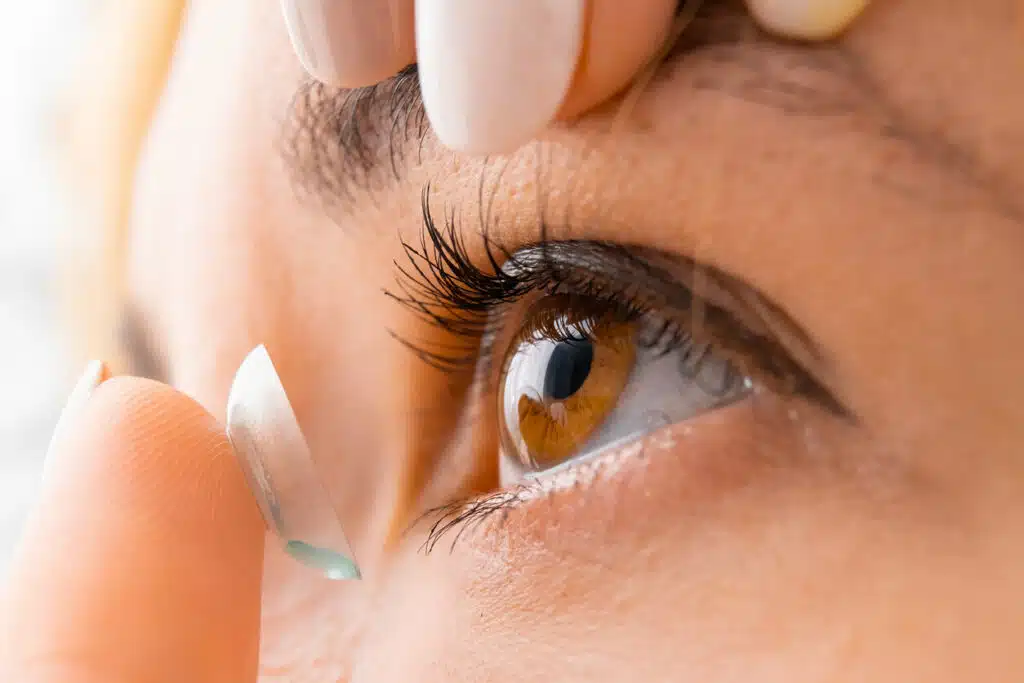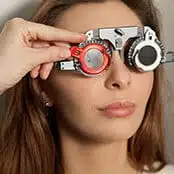
Contact lenses have been one of the most popular and viable vision correction options among people who want clear vision without the appearance of wearing glasses. These thin, curved medical devices sit on the clear outer layer of the eye, called cornea, to correct vision problems such as farsightedness, nearsightedness, and astigmatism.
Contact lenses are comfortable and provide a more natural and unobstructed view than prescription glasses.
Proper contact lens fitting and care are essential to ensure comfortable and safe contact lens wear. This is where the expertise of an optometrist comes into play. An optometrist is a healthcare provider who specializes in caring for your eyes and vision.
Let’s discuss the importance of contact lens fitting and care and how an optometrist can help with comfortable and safe contact lens wear.
Importance of Contact Lens Fitting and Care
Just like with many things in life, there’s no one-size-fits-all approach to contact lenses. Wearing improperly fitted lenses can be uncomfortable and even harmful to your eyes. Since contact lenses sit directly on the cornea, which varies slightly from person to person, accurate measurements are vital.
For a proper fit, an optometrist considers any existing eye conditions such as dry eyes, allergies, corneal scars, or irregular surfaces. Proper care is also essential for maintaining comfort, safety, and the lifespan of the lenses.
How Can an Optometrist Help?
An optometrist has all the expertise and training to assess eye health and determine if a person is a good candidate for contact lens wear. They can also fit the lenses properly to ensure a comfortable and safe fit and teach a person how to care for their contact lenses properly. You can also expect an optometrist to monitor your eye health while you wear contact lenses.
To determine the best type of contact lens for your specific need, an optometrist thoroughly examines your eyes. They will assess your eye health, measure your visual acuity, and check for any conditions affecting your suitability for contact lenses.
They’ll also measure the curvature of your cornea using a device known as a keratometer. During this test, you will be simply asked to rest your chin on a support while the instruments take photographs of your eye. Photos will be used to analyze the refraction of light from the cornea to help the doctor examine the exact curvature of your eye and the size of contact lenses that you will need. Should you have a hard-to-fit cornea, an optometrist will use corneal topography to get a more precise picture of the shape of the corneal surface.
It is important to note here that an optometrist would also talk about your lifestyle preferences and medical history to determine the type of contact lenses that are right for you.
Based on your eye measurements and needs, they will determine the appropriate prescription for your contact lenses and recommend the best type. Options for contact lenses include soft lenses (daily, biweekly, monthly) and rigid gas-permeable lenses.
An optometrist often provides trial lenses to ensure that selected lenses fit well and provide clear vision. Trial lenses also help them evaluate how lenses sit on your eyes and whether you show any discomfort or complications.
You can also expect your optometrist to use a biomicroscope to have a magnified view of the cornea with contacts. The device will help assess the fit and detect and assess any change in the health of your eyes after you begin wearing contact lenses. You can also expect several follow-up visits after the initial fitting and some instructions on how to care for contact lenses for maximum comfort and health.
These instructions may include the following.
- Always wash your hands before handling contact lenses. This will ensure your hands are clean and dry to avoid transferring dirt or bacteria to your eyes.
- Use the recommended contact lens solution to disinfect and clean your lenses. Rub the solution gently onto the lenses to remove protein deposits, debris, and microorganisms.
- Always store your lenses in a clean case filled with fresh solutions.
- Replace your contact lenses timely.
- Remove lenses before showering, swimming, or coming into contact with water, as water can introduce harmful bacteria and other organisms to your eyes.
- Attend follow-up appointments with your optometrist to monitor your eye health and the condition of your contact lenses.
- See your optometrist right away if you experience any discomfort or change in vision.
Optometrist in Washington, MO
If you are in search of a highly trained and reputable optometrist for comprehensive vision care, contact our optometrists here at Advanced Sight Center. Our team of eye doctors consists of optometrists and ophthalmologists who are committed to providing you with the highest quality personalized eye and vision care with advanced diagnostic tests and cutting-edge treatments. At our optical boutique, we carry the latest contact lenses and sunglass lenses such as No-line bifocal, single vision, Varilux® progressive, photochromatic (darken outdoors), sports, and safety lenses. We have lenses that range from daily wear, extended wear, bifocal, astigmatic, colored, disposable, and aphakic lenses.
If you would like to schedule an appointment with our optical department, call us today at (636) 239-1650 or use our convenient online appointment request form.



